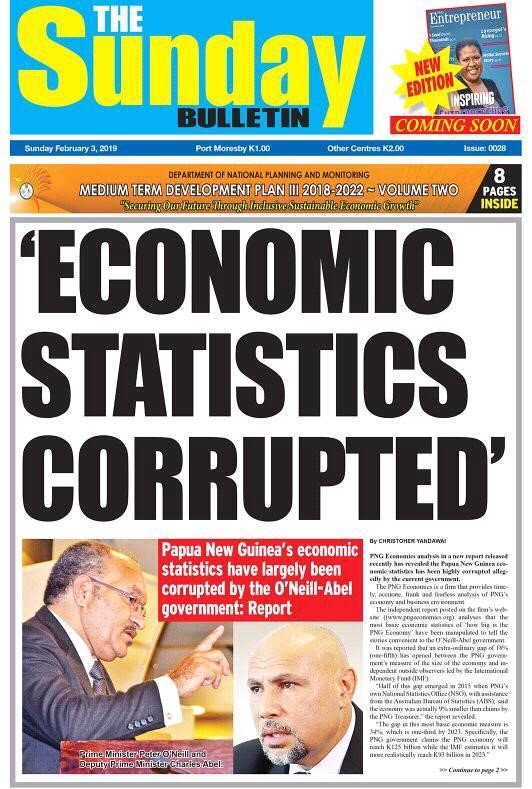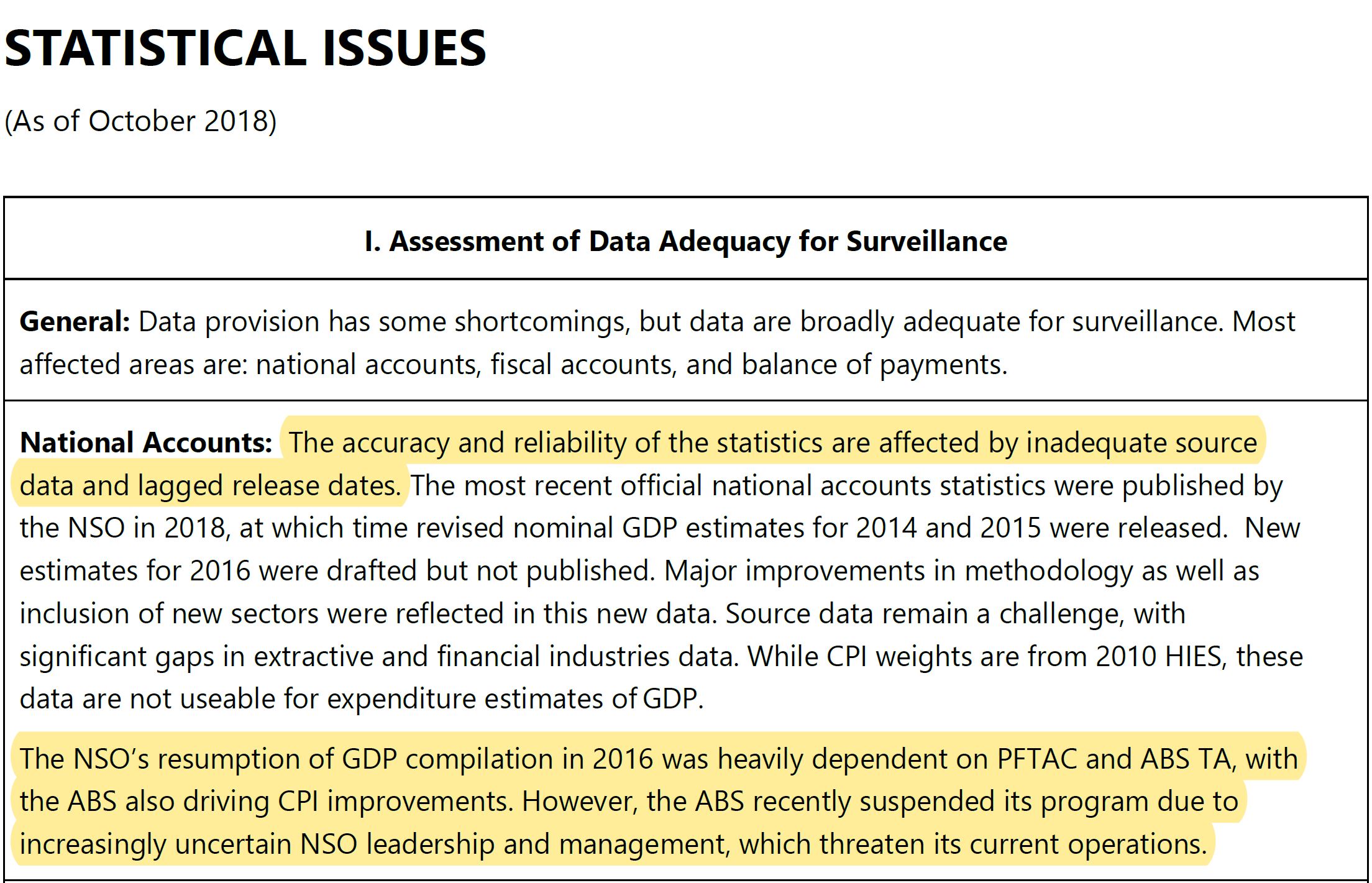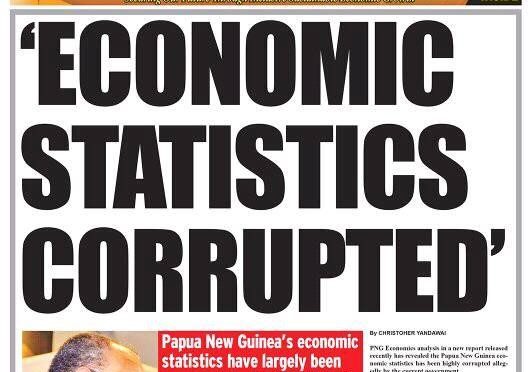The PNG Treasurer has provided inadequate responses to recent coverage of the corruption of PNG’s economic statistics.
Late on Saturday evening I was surprised that PNG Treasurer Charles Abel was responding directly on Facebook to my recent blogs on this issue. The front page of PNG’s weekend paper, the Sunday Bulletin, which featured with the heading “Economic Statistics Corrupted”, possibly contributed to the direct Facebook comments from the Treasurer. Later Facebook coverage highlighted an earlier response from the Treasurer.
Democracy thrives on discussion and debate. I congratulate ‘The Sunday Bulletin’ for being brave enough to cover the issue. The story is not “fake news” and the report from PNG Economics covering the issue, supported by analysis from other independent think tanks and universities, was worthy of a news article. However, in an environment where there is clear pressure on the PNG press not to cover unfavourable stories about the O’Neill/Abel government, I can imagine the ferocity of the phone call from a certain advisor in the Prime Minister’s office and the threats that could be made.
Following are the two responses I have from the PNG Treasurer, and my responses provided on Facebook over the weekend. Putting these in a single article will hopefully allow the discussion to continue – possibly allowing for some honest reflection on how to make for better statistics to inform better policy in PNG.
The two key elements of my responses are:
- As the Treasurer indicates, the rules for calculating the size of the economy (GDP) were significantly changed. However, these changes occurred in 2017 and the government was very happy with these new rules covering the first eight years (2007 to 2014) which led to major increases in measured GDP. They immediately built the new figures into their economic policies. However, using the same rules, the 2015 figures published in March 2018 were politically inconvenient for they showed the non-resource economy in a severe recession (negative growth) and risked breaking the legislated debt to GDP target. The Treasurer only cries foul and sends the rules off for further examination when they don’t suit his political story. If the 2015 GDP numbers was the first release under the new rules then I could understand the argument. But to only object to the ninth year indicates other motives.
- The Treasurer tries to validate his approach by referring to the support from the IMF and ABS, and implying that they agree there is a major problem. However, the ABS has quietly walked away from the fiasco and latest reports indicates it has suspended its technical assistance report. The IMF continues to release the original numbers from the NSO/ABS/IMF March 2018 report despite requests from the government not to do so. The Treasurer’s international friends have left him on this issue. They don’t like getting involved in what amounts to the corruption of PNG’s statistics.
Following are the two complete Facebook discussions covering the statistics. I’ve included comments from others that also participated. The first response was immediately following my fourth blog exploring the four motives behind the corruption of PNG’s economic statistics. The response covers two paragraphs and I respond separately to those. The second response from Abel was included as as “conversation starter” on Paitum Garamat on Sunday 3 February. It included the front page of the Sunday Bulletin. I’m not sure when Treasurer Abel made the specific comments or which article he was responding to – but they have been relayed to me from several sources.
1. Treasurer Abel’s response on Facebook (Sharp Talk Saturday 2 February).
Charles Abel Paul there is no deliberate attempt to manipulate numbers. In fact we are working closely with the IMF and the World Bank in many dinancial reforms. This has resulted in a graduation back to budget support modality funding and a successful inaugural sovereign bond issue.
The IMF has changed the method of GDP calculation. Preliminary application of this method by the NSO has created a discrepancy with the Central Bank and Treasury numbers. Queries of the application by NSO have lead to acknowledgement by the IMF and ABS that the queries have basis and proper consultation is required before rule changes like this are finalised. The NSO results are preliminary and final numbers will be published in February with the support of the IMF and Australian Bureau of Statistics.
Paul Flan Dear Treasurer. Thank you for responding as an exchange of ideas and perspectives is good for democracy. With the utmost of respect, your opening paragraph fills me with concern (I will comment on the second paragraph shortly). Of course, there have been attempts by the IMF, World Bank, ADB and others to try and reverse the decline in PNG’s economic management – a decline documented in ratings over recent years that have moved PNG into being classified as the only APEC “fragile situation” state. However, it would seems as if this assistance is being given lip service at one level, but then ignored when faced with the realities of politics. The clearest example of this was your change to the Fiscal Responsibility Act in 2017 to move the primary budget deficit target to an average of zero (over the medium-term) of the non-resource fiscal balance as a share of non-resource GDP. Agreement was given to the budget support loan on the basis of this target being included in your 2019 Budget Strategy – and before your 2019 Budget figures were actually released. However, your 2019 didn’t deliver on this commitment. This was not a slight deviation – it was close to a billion Kina of additional expenditure over what you had committed to as the first priority when PNG received the assistance. There appears to be a track record for asking for assistance, accepting it when convenient, but then over-turning it during the rigour of the budget process. I discussed this characteristic of your last two budgets in a recent edition of the East Asia Forum.
Nelson Kopunye I heard about this on Radio Australia the other day
Paul Flan In response to your second paragraph, I just highlight that three earlier articles (see pngeconomics.org as well as on Sharp Talk) have gone into some additional background. When responding to a similar explanation as provided in your 2019 Budget, I asked the question as to why the Treasury and Central Bank where happy with this changed methodology which covered 2007 to 2014? Why were they happy with the first eight years of changes, but unhappy with the ninth? Yes there was an updated methodology and this had dramatic impacts in portraying the government’s performance – the move from the orange line down to the red line. Everyone seemed happy with this massive initial change. However, when the same methodology produced an inconvenient number, it is not used, a committee is set up to examine the issue six months after the draft release, and it seems possible that updated numbers will be released nearly one year after the initial draft was released. Anyway, your last sentence indicates that the ABS has returned to help with the updated figures. Could you please just confirm that the ABS has lifted its suspension of working with the NSO which the IMF documented as recently as December? With respect and always happy to discuss further.
2. Treasurer Abel’s response copied on Facebook (Paitim Garamat Sunday 3 February)
Cent Marak shared a post.

Trex Kalik to Alotau District
Wehley George Kanari Wow Incredible Stats
Aloysius Maneo Not surprising though ..its a fact.
Matthias Lasia ValeRius I hope UnABel and PO will not say Fake News ✌✌😜😜😜
Cent Marak I’ve responded to this many times already. Its a claim by Paul Flanagan in Australia. IMF changed the ground rules for calculation of GDP recently and the NSO rushed to publish some preliminary numbers showing a discrepancy with the numbers from BPNG a…See More
Daoni Esorom Cent Marak . It just shows yet again the lack of coordination and communication between key government departments and institutions on key issues so pertinent to the management of the country’s economy. This time key government departments not communicating on key economic formulas. This time NSO gets the blame. Next time it will some one else. So damaging though. And it’s certainly won’t be the last. Expected in governments with weak systems like ours where blame and lieing is the norm. So typical of PO-Abel government.
Cent Marak Daoni Esorom that’s the response from our DPM
Daoni Esorom Cent Marak. The DPM response does not reflect the realities and the truth. I will believe an economist and not a singer cum MP. You take your pick.
Paul Flan Hi Cent. Thanks for posting – as I’m banned from the country by the Prime Minister for suggesting that the fall in oil prices in late 2014 would affect the budget (that was met with accusations of fake news, LNG contracts were at fixed prices and there would be no impact on the budget – unfortunately, I was right again on that one) I don’t get to see the Sunday Bulletin anymore. Anyway, I had a similar discussion with the Treasurer on Sharp Talk late last night. I am copying that below and will post also on the pngeconomics website and facebook page:
[Complete copy of the first conversation was placed on Facebook – not repeated here for the sake of brevity – except that I included an introduction to the extract from the IMF report indicating the ABS had pulled out]
Paul Flan This is an extract from the latest IMF report – it indicates the ABS is no longer supporting preparation of a response to new GDP numbers. This was probably the final straw, along with the very poor attempted explanation in the 2019 Budget, for deciding to call the GDP games as a corruption of PNGs Statistics.

Paul Flan And Cent, if you want to use a football story, the facts are that the rules were changed and accepted by the O’Neill/Abel team for the eight years 2007 to 2014. The O’Neill/Abel team really liked the new rules and quickly scored eight tries as it made their economic management look better. Then the other team scores two tries under the same rules and the O’Neill/Abel side now decide to dispute the rules in a show of bad sportmanship. One umpire, the Australian Bureau of Statistics, has left the field in disgust. The other umpire (the IMF) is still saying the 2015 and 2016 numbers are valid in all of its publications. O’Neill/Abel have now gone to the video referee – and we all know what pressures and incentives that can bring. All other economic indicators for 2015 indicated there was a severe recession in the PNG economy outside of the resource sector – employment was falling, business sales were falling, tax collections were falling (due to falling incomes, profits and consumption), imports were collapsing, private sector investment was suffering and there was the worst drought in 20 years. Just accept the facts based on new rules that everyone accepted because the new rules were actually better in measuring the size of the economy. The government shouldn’t cry when the new rules don’t bring the facts that they want – just accept the new facts and try and create better economic policies for the people of PNG.
Matthias Lasia ValeRius Paul Flan thank you Paul 👍😀
Cent Marak Thanks Paul… Taxpayers deserve to know the truth
Daoni Esorom Cent Marak ..And politicians must not lie to the masses including those who know more than them.
Soctinec Sophin Malakhu Wow, very brave reporting.
Vincent Agi Omi Wow… The mysterious mysteries..
James Masa Tell the truth! People are dying because of lack of medicines. Hiw dare you ride on people’s suffering?

